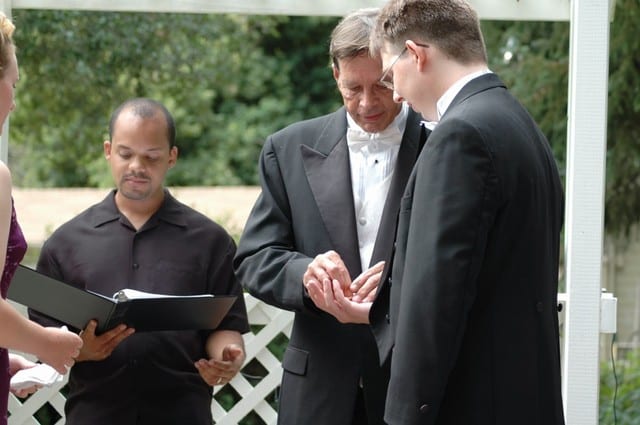[This year is the 20th anniversary of Cape Cod Light by Michael Hattersley. The other parts of this series are here.]
Michael taught me about etymology. He taught me how many words in English have synonyms of different origin, from the Germanic and from the Latin. Veal and lamb, cardic and heart, cerebrum and brain. The Latin often feels flowery and poetic, the Germanic feels forthright and staccato; but he also taught me how English’s fusion of the two traditions allows its poets to transition between the two modes for rhythmic effect, as with Eliot:
Streets that follow like a tedious argumentOf insidious intentTo lead you to an overwhelming question …Oh, do not ask, “What is it?”Let us go and make our visit.

Michael presenting the rings at my wedding.
Michael had a PhD in English literature; his dissertation was on difficult poetry (Poets of Light: Ezra Pound, William Carlos Williams, and Wallace Stevens), but he loved the popular forms, too. He was obsessed with music, especially folk, pop, and rock; he was a huge fan of The Beatles, Squeeze, Michael Jackson, and (above all) Paul Simon; he listened to their albums over and over, studying the lyrics.
He loved poring over the historical Billboard charts and arguing about who deserved to be there. He never understood our appreciation for Billy Joel. He always insisted Bob Dylan deserved the Nobel Prize, but never thought it would actually happen (oh the triumph he would have gloated with if he had only known!).
Poetry and pop music for Michael was no escapist diversion. The second poem in Cape Cod Light is dedicated to the great American poet John Ashbury, and is about the ways that poetry defines and humanizes us.
In Body Knowledge Michael muses how, from their accidental origins millennia ago to their pleasing groupings as they pour off the pop charts, words shape who we are as a species, a culture, and individuals.
The process is not neat: they smack into our senses, our interiors are stung by their hard cores and ragged edges, vestiges of the natural selection of etymology. But that’s how they get through to us, if we are willing to let them, and how they slowly mold us, heal us, and prepare us the for what the future holds.
[Body Knowledge first appeared in Poetry: A Magazine in Verse.]
Body Knowledge
(to John Ashbery)
These chose to be passed on
Because of how they sounded in the ear
And how practical they proved in daily life
Before they were frozen into print.
Now we’re stuck with them,
And their fragments fly about us, all
Hard cores and ragged edges. Because their teeth
Remind us of jigsaw puzzles doesn’t mean they fit,
Although ultimately, no doubt, they do, and even now,
Words from the latest song about failed love
Snap together with what some shepherd chanted
Near the Mediterranean, some forgotten summer,
To reveal the root of last week’s feelings. Then, I wondered
About your body while you were out of my sight,
And reviewed the boy whose T-shirt pictured a galaxy
With an arrow labeled: You Are Here. It was not so true
As sound passing from without to within,
With its body knowledge of distance and echoing space.Stung by words and tunes,
Our interiors shower crystals of sentiment, their paths
Leave traces against the black, and the debris
Drifts, piles up in corners like snow. We fill up
Until we die in the extravagance of experience
That has been lavished upon us. If they can be deceived,
The senses cannot lie; they have been shaped
By what smacks against them. They give what they get.
The necessary delusion: this clean line between life and death.
The danger: that we will recognize the stones are doing their part
And lie down among them. These old songs
Feature the landscape and vanish. If we can remain
Vulnerable to each tone as it passes,
The hollow in our heart
That feels now like an avoidable sadness
Will grow vaster and vaster, until it contains
Every seed of tomorrow’s arrival.
The next poem is here.

Thanks! Fixed!
> Words from the latest song abut failed love
It scans OK as “abut”, but it is not “abut” but rather, “about” (originally; ironically, “abut” seems more original).
Makes one wonder what true superpositional poetry would be like.